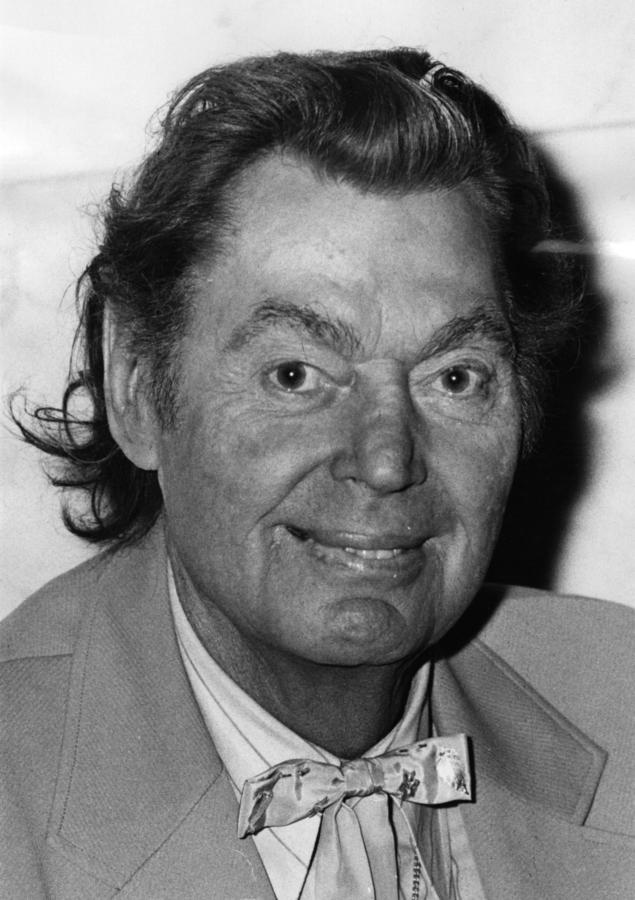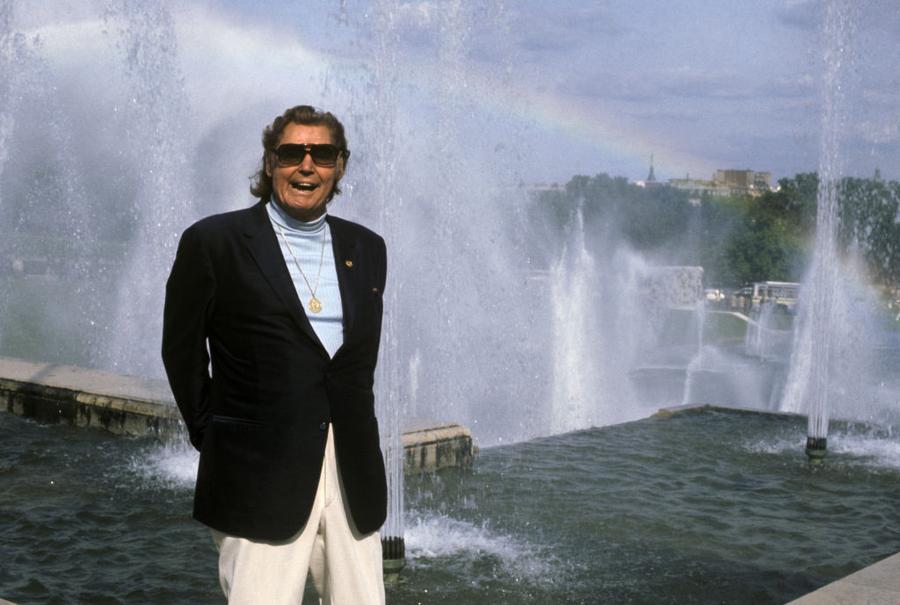What Was Johnny Weissmuller's Net Worth?
Johnny Weissmuller was an Austro-Hungarian-American competitive swimmer and actor who had a net worth equal to $2 million at the time of his death in 1984 (after adjusting for inflation). Johnny Weissmuller was best known for starring as Tarzan in a series of films in the 1930s and 1940s. Johnny was also one of the fastest swimmers in the world and won five Olympic gold medals in swimming and a bronze medal in water polo. He set more than 50 world records and won more than 50 U.S. national championships. Johnny was the most well-known Tarzan of the dozens of actors to play him and starred in 12 of those films. He also starred as Jungle Jim in several films and the TV series of the same name from 1955 to 1956. Weissmuller passed away on January 20, 1984, at 79 years old from pulmonary edema.
Later in life, Weissmuller estimated that his total earnings from acting amounted to around $2 million, roughly $20 million before taxes and divorces and after adjusting for inflation.
Outside of acting, Johnny lent his name to health food, cocktail lounges and even a swimming pool construction company.
Early Life
Johnny Weissmuller was born Johann Peter Weißmüller on June 2, 1904, in Freidorf, Temes County, Austria-Hungary. He came from a Banat Swabian family. In early 1905, Johnny's parents, Elisabeth and Peter, took him to Ellis Island on the S.S. Rotterdam. They lived with family in Windber, Pennsylvania, and Johnny's younger brother, Peter, was born in September of that year. The family moved to Chicago three years later to be near Weissmuller's maternal grandparents. When Johnny was nine years old, he contracted polio, and his doctor told him that swimming might help his recovery. Weissmuller had his first swimming lessons at Fullerton Beach, and he excelled very quickly and subsequently began entering and winning races. When Johnny was in the eighth grade, his father left the family. Weissmuller dropped out of school and started working to support his family. At the age of 11, Johnny lied to the YMCA about his age because they required children to be at least 12 years old to compete in swimming races. Weissmuller won every race he entered and also showed promise in high jumping and running. He soon joined the Illinois Athletic Club, one of America's best swim teams.

Central Press/Getty Images
Swimming Career
Johnny tried out for Bill Bachrach, and the swimming coach was impressed and became a mentor to Weissmuller. He embarked on a competitive swimming career in August 1921 and won all four Amateur Athletic Union races he entered. In September 2021, Johnny set world records in the 100m and 150yd events. In July 1922, he broke Duke Kahanamoku's 100-meter freestyle record with a time of 58.6 seconds. At the 1924 Summer Olympics, he won gold medals in the 100 m freestyle, 400 m freestyle, and 4×200 m freestyle and a bronze medal in the team water polo event. At the 1928 Summer Olympics, Weissmuller won gold medals in the 100 m freestyle and 4×200 m freestyle. Around this time, he became interested in John Harvey Kellogg's holistic views on exercise and nutrition and traveled to Kellogg's sanatorium in Michigan to dedicate its new swimming pool and break one of his swimming records. In 1927, Johnny set a world record in the 100-yard freestyle (51.0 seconds). During his swimming career, he won 52 national championships and set more than 60 world records. Weissmuller was the first man to complete the 100-meter freestyle in less than one minute and the 440-yard freestyle in less than five minutes. In 1950, the Associated Press named Johnny the best swimmer of the first half of the 20th century.
Acting Career
Johnny's first film was 1929's "Glorifying the American Girl," in which he had a non-speaking role as Adonis. In 1932, he starred as Tarzan in the film "Tarzan the Ape Man." He reprised his role in 11 more films, including "Tarzan and His Mate" (1934), "Tarzan's Secret Treasure" (1941), "Tarzan and the Amazons" (1945), and "Tarzan and the Mermaids" (1948). Weissmuller also appeared in films such as "Swamp Fire" (1946), "Cannibal Attack" (1954), "Jungle Moon Men" (1955), "Devil Goddess" (1955), "The Great Masquerade" (1974), and "Won Ton Ton, the Dog Who Saved Hollywood" (1976). In 1948, he starred as the title role in the film "Jungle Jim." He went on play the role in numerous other films as well as the television series "Jungle Jim," which aired 26 episodes from 1955 to 1956.

(Photo by Francois LOCHON/Gamma-Rapho via Getty Images)
Personal Life
Johnny was married five times, and his first wife was singer Bobbe Arnst, who he wed in 1931. After their 1933 divorce, Weissmuller was married to actress Lupe Vélez from 1933 to 1939. Next, he married Beryl Scott in 1939, and after they divorced in 1948, he wed Allene Gates in later that year. Johnny and Allene divorced in 1962, and he married Maria Gertrude Baumann in 1963. Weissmuller remained married to Baumann until his death in 1984. Johnny and Beryl had three children together, Johnny Jr., Wendy, and Heidi, and sadly, Heidi died in a car accident as a teenager. Weissmuller saved the lives of many people, including 11 people who were in danger of drowning after a 1927 boat accident. In the mid-1970s, he broke his leg and his hip, and when he was in the hospital, he learned that he was suffering from a serious heart condition. Weissmuller had a few strokes in 1977, and in 1979, he spent several weeks at the Motion Picture & Television Country House and Hospital.
Death
On January 20, 1984, Johnny passed away at the age of 79 from a pulmonary edema. He was laid to rest at the Valley of the Light Cemetery outside Acapulco, Valle de La Luz. A recording of his Tarzan yell played as Weissmuller's coffin was lowered into his burial plot. President Ronald Reagan and Senator Ted Kennedy arranged for a 21-gun salute to take place at Johnny's funeral.
Awards and Honors
In 1960, Johnny received a star on the Hollywood Walk of Fame in the Television category. In 1965, he was inducted into the International Swimming Hall of Fame; he was also the founding chairman. In 1973, Weissmuller was honored with the George Eastman Award for "distinguished contribution to the art of film." The Paris swimming pool and hotel complex Piscine Molitor was built in tribute to Johnny in the late 1920s.
/2018/05/Johnny-Weissmuller-1.jpg)
/2021/09/Caeleb-Dressel.jpg)
/2016/08/Katie-Ledecky.jpg)
/2012/06/Mark-Spitz.jpg)
/2016/08/Allison-Schmitt.jpg)
/2019/09/ron-ely.png)
/2020/07/mlp.jpg)
/2010/01/Deryck-Whibley.jpg)
/2020/07/jl.jpg)
/2010/01/GettyImages-183679600.jpg)
/2022/10/Anne-Murray.jpg)
/2014/09/Kim-Delaney.jpg)
/2009/11/Tim-Duncan.jpg)
/2023/01/lance-armstrong.jpg)
/2021/04/Sara-Gilbert.jpg)
/2025/03/Kelli-Ferrell.jpg)
/2010/05/Jaleel-White.jpg)
/2018/05/Johnny-Weissmuller-1.jpg)
/2019/09/ron-ely.png)
/2016/08/Katie-Ledecky.jpg)
/2021/09/Caeleb-Dressel.jpg)
/2012/06/Mark-Spitz.jpg)
/2016/08/Allison-Schmitt.jpg)
/2012/08/GettyImages-142042517.jpg)
/2016/08/nathan.jpg)